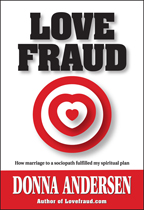 I recently attended a small party — about 15 people — at a friend’s home. I got into a conversation with two women, neither of whom I knew before. They both revealed that, like me, they had endured relationship abuse. We started swapping stories.
I recently attended a small party — about 15 people — at a friend’s home. I got into a conversation with two women, neither of whom I knew before. They both revealed that, like me, they had endured relationship abuse. We started swapping stories.
The first woman worked hard all her life, built a successful career, and then married the guy who, over about seven years, took advantage of her assets. She described his lies, mostly about money, as “gaslighting.”
The second woman had three children with a man who turned out to be a controller, moving her away from family and friends. She spent 20 years trying to shield the children from his destructive ways, then finally divorced him.
I was amazed. Years ago, when I first launched Lovefraud, no one talked about relationship abuse. Now, people are familiar with terms like “gaslighting” and “narcissist.” Discussion of relationship abuse has gone mainstream — it’s now an acceptable topic of conversation at social events.
This is terrific progress, because:
- The best way to deal with relationship abuse is to avoid it.
- The best way to avoid relationship abuse is to know it exists.
- And the best way to know relationship abuse exists is to talk about it.
So, how do you have a polite conversation about relationship abuse? Here are some tips:
First, focus on your own recovery
If you are still feeling traumatized about your experience, it’s fine to talk about what happened to you with a competent therapist, or someone who shares your experience. But it may be premature to talk about it to a casual acquaintance, or even friends and family.
Why? Because many people have difficulty listening to stories of relationship abuse. As Dr. Karin Huffer explained, protective filters kick in. “If an individual begins to share with another and the data threatens the listener’s feelings of safety,” she says, “they may try to divert the data or simply not hear it at all.”
Much human communication is nonverbal — it’s tone of voice, gestures, body language. When you’re still traumatized about what happened, your listeners can sense this — and it scares them. They react to your emotional vibes — and shut out what you are saying.
So before engaging in a casual conversation about your experience, you need to be far enough along your healing journey that you can discuss it calmly. You’ll get there. But until then, it’s probably best to keep the details vague.
Second, educate yourself about personality disorders and relationship abuse
You’ve been through the experience. But, from an educational perspective, here are the basic facts:
1 . The people who engage in relationship abuse usually have some level of an exploitative personality disorder — antisocial, narcissistic, borderline, histrionic or psychopathic. (Lovefraud groups them together under the umbrella term of “sociopaths.”)
2 . Approximately 30 million adults in the United States could be diagnosed with one of these disorders. Sociopaths are male and female, all races, all religions and can be found in all segments of society.
3 . Sociopaths target normal people and hijack the human bonding system. At first, they are typically charming, exciting and charismatic. Later, once they have hooked you into a relationship, they become controlling and abusive.
4 . Although many people believe sociopaths are serial killers, very few of them actually commit murder. In fact, many sociopaths engage in behavior that is immoral or unethical, but not necessarily illegal.
5 . Sociopaths are not delusional. They know exactly what they are doing.
Third, wait for opportunities to talk about relationship abuse
There was a time when relationship abuse simply wasn’t mentioned. Times have changed.
The #MeToo movement is drawing attention to sexual assault. TV shows such as Dirty John, Surviving R. Kelly, and Seduced by Evil bring relationship abuse right into your living room. So now, more than ever, the topic is likely to come up in general conversation. When it does, it’s an opportunity for you share what you know.
Here’s the point that I suggest you make: It can happen to anyone.
People tend to believe that relationship abuse only happens to women with low self-esteem. That’s not true. First of all, it happens to both men and women. And secondly, it happens to people who are accomplished, successful and achievement-oriented — and who have a vulnerability. Guess what? We all have vulnerabilities, so we are all potential targets.
Whether you share any of your experience or not — that’s totally up to you — you can certainly share your insight. So when an opportunity arises, please keep the conversation going. The more we talk about relationship abuse, raising general awareness of the signs and symptoms, the more others can escape before too much damage is done.




































 Wednesday Webinar: Why it’s hard to get over a sociopath and how to recover
Wednesday Webinar: Why it’s hard to get over a sociopath and how to recover
emilie18
Just after I found out my ex was cheating on me, after I realized how much of his life was a fabrication and how much of my life was a lie, I was devastated. When people asked how I was I would say “OK” but I was dying inside. I was too ashamed and mortified to admit I had been conned for 2 years, that I was so easily manipulated, that I had lost not only money but self-esteem. I tried hard to maintain the facade of the confidant leader, the self-assured, independent woman I had always been. But I hated myself. Then I started reading about others like me, hoping to find a common ground and understanding of why I – of all people – ended up this way. When I realized it was not me but him – and there were a LOT of “hims” out there, I started opening up to others about what had happened. To my pleasant surprise no one blamed me – they knew me – the true me – and embraced me and loved me. I was so very grateful. So now, when conversations come up with women (and men) who are in similar straits, I tell them my story and suggest various places to get information. I tell them that it can happen to anyone – that these people are master manipulators, readers of vulnerabilities and damned good at entrapping – and it has nothing to do with their true selves – it is a con game and they are the victims. A friend’s son is involved with a horrible woman, the mother of their baby, who has been putting him through hell during their divorce. I gave her some articles to send him and some techniques to use. He told her the other day how much they have helped him anticipate and understand her manipulations. A co-worker is involved with a Jekyll and Hyde personality. I sent her to this website. She is slowly extricating herself from his emotional terrorism.
Don’t be fearful of sharing your pain – it may bring up demons and nightmares, but it could help another innocent understand their situation and, perhaps, help them survive.
Donna Andersen
Thanks emilie18 – that was my experience as well. Once I started learning about the disorder, and telling my story to others, I was shocked by how many people said, “something like that happened to me,” or, “I know someone that happened to.”
Sociopaths are everywhere. Their targets are everywhere. Once we start talking about it, we realize we are not alone, and the problem is huge.